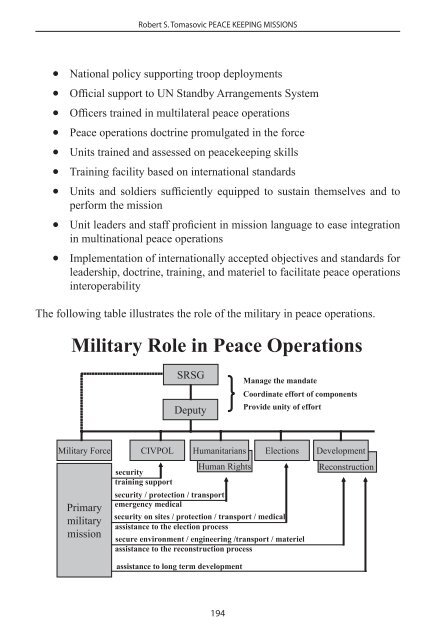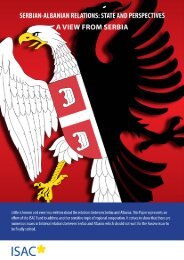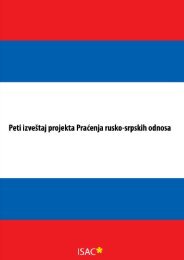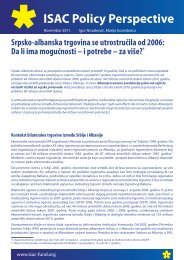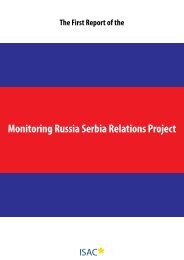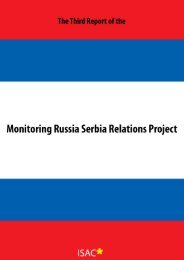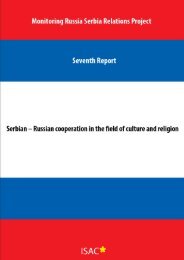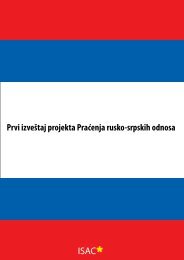the process of security sector reform - ISAC Fund
the process of security sector reform - ISAC Fund
the process of security sector reform - ISAC Fund
You also want an ePaper? Increase the reach of your titles
YUMPU automatically turns print PDFs into web optimized ePapers that Google loves.
Robert S. Tomasovic PEACE KEEPING MISSIONS<br />
Robert S. Tomasovic PEACE KEEPING MISSIONS<br />
• National policy supporting troop deployments<br />
• Official support to UN Standby Arrangements System<br />
• Officers trained in multilateral peace operations<br />
• Peace operations doctrine promulgated in <strong>the</strong> force<br />
• Units trained and assessed on peacekeeping skills<br />
• Training facility based on international standards<br />
• Units and soldiers sufficiently equipped to sustain <strong>the</strong>mselves and to<br />
perform <strong>the</strong> mission<br />
• Unit leaders and staff pr<strong>of</strong>icient in mission language to ease integration<br />
in multinational peace operations<br />
• Implementation <strong>of</strong> internationally accepted objectives and standards for<br />
leadership, doctrine, training, and materiel to facilitate peace operations<br />
interoperability<br />
The following table illustrates <strong>the</strong> role <strong>of</strong> <strong>the</strong> military in peace operations.<br />
In summary, peace operations are characterized by <strong>the</strong>se points:<br />
• Participation in peace operations is selective.<br />
• Participation is consistent with national policy and <strong>the</strong> requirements to<br />
maintain war-fighting readiness and multi-mission capabilities.<br />
• Nations seek to improve effectiveness <strong>of</strong> international peace operations<br />
by enhancing <strong>the</strong>ir capabilities as well as those <strong>of</strong> o<strong>the</strong>r countries and <strong>the</strong><br />
UN.<br />
• Learning lessons from peace operations is a continuous <strong>process</strong>.<br />
• The price <strong>of</strong> peace operations is preferable when compared to <strong>the</strong> cost <strong>of</strong><br />
conflict in human terms and in cost.<br />
CIVILIAN POLICE IN UN PEACEKEEPING MISSIONS<br />
The mandate for Civilian Police in a peacekeeping mission varies according to<br />
<strong>the</strong> mission. Generally <strong>the</strong>y assure (or establish that) <strong>the</strong> local police operate<br />
according to internationally recognized standards <strong>of</strong> policing in a democratic<br />
society and <strong>the</strong>y understand and adhere to <strong>the</strong> principles <strong>of</strong> basic human rights<br />
and freedoms. In doing so, <strong>the</strong>y establish a safe and secure environment within<br />
<strong>the</strong> mission area. Specifically Civilian Police may be charged with any or all <strong>of</strong><br />
<strong>the</strong>se duties:<br />
• Monitoring <strong>the</strong> actions <strong>of</strong> <strong>the</strong> local police<br />
• Advising, training and helping local police<br />
• Establishing police services and enhancing <strong>the</strong>ir work<br />
• Integrating all component <strong>of</strong> <strong>the</strong> criminal justice system (police, courts<br />
and corrections) to ensure comprehensive and sustainable RULE OF<br />
LAW<br />
The first Civilian Police involvement in peacekeeping missions started in 1960<br />
in <strong>the</strong> Congo. They are now employed in all thirteen UN peacekeeping missions,<br />
(including an ongoing mission <strong>of</strong> over 30 years in Cyprus), with over 7,000<br />
police <strong>of</strong>ficers serving in <strong>the</strong> missions and 80 different countries contributing.<br />
Since 1988 (Namibia) <strong>the</strong> importance <strong>of</strong> Civilian Police in peace operations has<br />
increased sharply. For example:<br />
194 195


